 Petzlover
Petzlover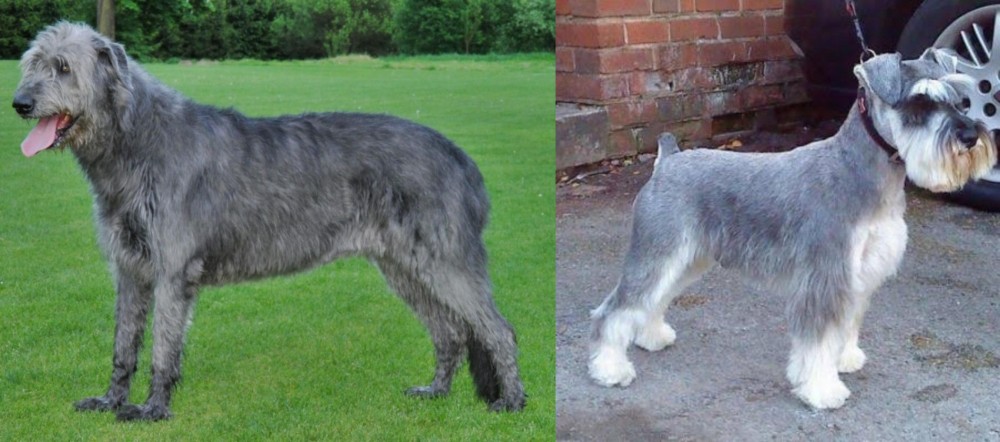 Irish Wolfhound is originated from Ireland but Miniature Schnauzer is originated from Germany. Irish Wolfhound may grow 50 cm / 20 inches higher than Miniature Schnauzer. Irish Wolfhound may weigh 44 kg / 98 pounds more than Miniature Schnauzer. Irish Wolfhound may live 5 years less than Miniature Schnauzer. Irish Wolfhound may have less litter size than Miniature Schnauzer. Both Irish Wolfhound and Miniature Schnauzer requires Moderate Maintenance.
Irish Wolfhound is originated from Ireland but Miniature Schnauzer is originated from Germany. Irish Wolfhound may grow 50 cm / 20 inches higher than Miniature Schnauzer. Irish Wolfhound may weigh 44 kg / 98 pounds more than Miniature Schnauzer. Irish Wolfhound may live 5 years less than Miniature Schnauzer. Irish Wolfhound may have less litter size than Miniature Schnauzer. Both Irish Wolfhound and Miniature Schnauzer requires Moderate Maintenance.
 It is believed that the Irish Wolfhound is an ancient breed and that it was brought to Ireland as early as 7000 BC.
It is believed that the Irish Wolfhound is an ancient breed and that it was brought to Ireland as early as 7000 BC.
These dogs were bred as hunting dogs as well as guard dogs. There was a time when these huge canines were only allowed to be owned by the nobility. The breed died out somewhat, but Scotsman Captain George Augustus Graham made efforts to restore the breed’s numbers.
Captain Graham devoted his life to making sure the Irish Wolfhound’s numbers were built up, and the breeding program included Great Danes, Borzois, English Mastiffs and Scottish Deerhounds.
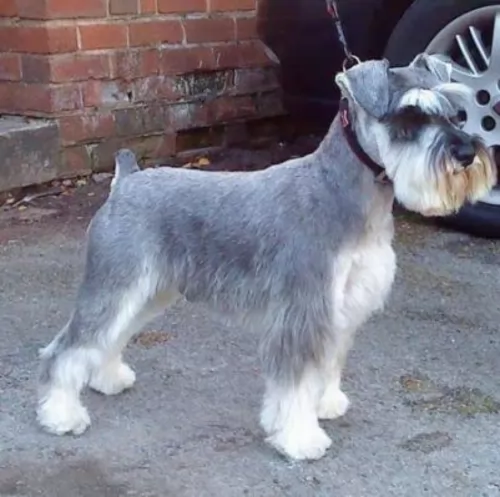 Miniature Schnauzers were first bred in Germany in the 19th century being bred from Affenpinschers and Standard Schnauzers.
Miniature Schnauzers were first bred in Germany in the 19th century being bred from Affenpinschers and Standard Schnauzers.
This dog was always used to control rats on farms, but these days he is more a companion. It is believed that the start of the modern Miniature Schnauzer in the United States was around 1924 when dogs were imported from Germany.
It was in 1933 that the Miniature Schnauzer was recognized by the AKC as a separate breed from the Standard Schnauzer.
 The tallest of the sighthounds, the Irish Wolfhound looks like a large Greyhound, only he has a rough, wiry type of coat.
The tallest of the sighthounds, the Irish Wolfhound looks like a large Greyhound, only he has a rough, wiry type of coat.
He is also gracefully built and known as a gentle giant. The double coat which can be fawn, red, white, grey, black or brindle is straight to wavy.
He stands at about 81 to 86cm and weighs roughly 48 to 54kg. This is one of the few dog breeds that you can’t really call social. He loves his own human family, and becomes unhappy and ‘down-in-the-dumps’ when separated from his family members for too long. He is a quiet dog who tends to be somewhat introverted and reserved, while being highly intelligent.
He will require being trained and socialized to make him obedient as he is an independent dog. He takes his role as family protector seriously and even though he is quiet, he is ready to take on anyone who threatens his property.
The Irish Wolfhound is a gentle, quiet, soft-natured, easy-going dog and even though it is such a large dog, it doesn’t throw it’s weight around but is calm and patient around the elderly and children in the home. It can tend to be aggressive with animals he isn’t familiar with.
He is an intelligent dog, but even so he may be quite resistant to training as he is strong-willed and determined to have his own way. These dogs need to be trained and socialized otherwise they just do their own thing.
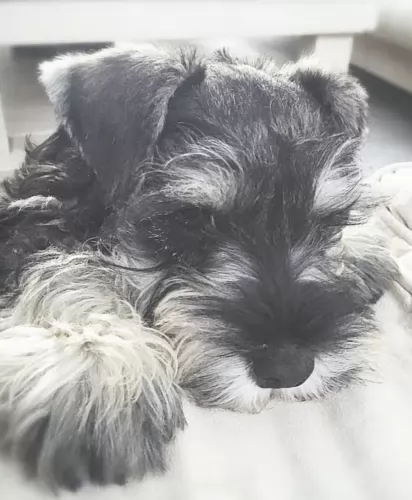 The Miniature Schnauzer is a small dog breed that stands between 30 to 36cm in height and weighs between 5 and 10kg.
The Miniature Schnauzer is a small dog breed that stands between 30 to 36cm in height and weighs between 5 and 10kg.
He has a sturdy body with a dense, wiry coat which most people prefer to have stripped. Because stripping is quite tedious, many of these dog owners prefer to have the coat clipped which actually gives the coat a greyish look to it.
The coat is usually a mix of black and silver. Some people refer to the Miniature Schnauzer as having a salt-and-pepper coat – hairs that are a mix of black and white. The dog has a double coat with the outer coat being wiry and the undercoat being a lot softer.
This is a dog that will need to be groomed frequently to prevent matting. A noticeable feature with these dogs is the rectangular shaped head with alert slanted eyes and bushy eyebrows, mustache and beard. In fact the word ‘Schnauzer’ means beard or muzzle.
The ears have been traditionally cropped but these days they are left and then they tend to be half-erect, half-floppy.
This is a tough little dog, fearless, cheeky, arrogant, alert and also friendly. A draw-card with him is that he is considered as a low-shedder and being hypoallergenic.
They’re very intelligent dogs too and will learn quickly when you give him training and socialization. This is important for a dog like this as he can quickly show you that he is strong willed and independent. Training and socialization makes him much nicer as he becomes more balanced and obedient.
He is full of life and extroverted and you can count on him to join you wherever you are and whatever you’re doing. Whether watching TV, swimming or hiking, he’ll be there and turn every occasion into a festive event. He is a loving, loyal dog, making a splendid pet.
He's protective of his human family and tends to be suspicious of strangers, and this is what makes him such a great watchdog.
 The most notable aspect of the Irish Wolfhound is his amazing height. The legs are long, the body narrow. He is gentle and easy-going but because he is a sighthound he loves to give chase after animals.
The most notable aspect of the Irish Wolfhound is his amazing height. The legs are long, the body narrow. He is gentle and easy-going but because he is a sighthound he loves to give chase after animals.
He is capable of living in the city or countryside, but your home will need to cater to his size. He isn’t particularly energetic, enjoying a quiet life but he will absolutely need to be exercised.
Provide your gentle giant with everything needed to make him content, and you’ll have a faithful, loving friend for about 10 years.
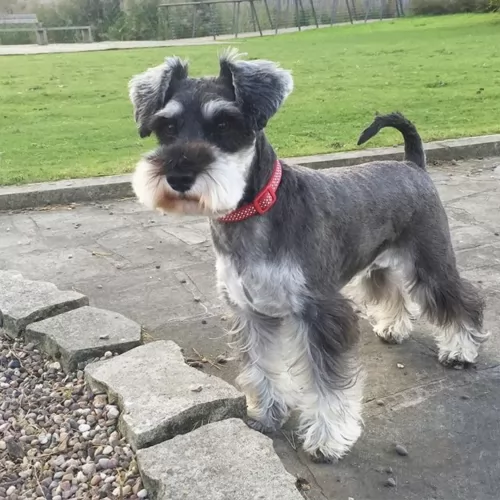 Miniature Schnauzers are such adaptable little dogs, quite happy to make a home with you in the city or in the countryside.
Miniature Schnauzers are such adaptable little dogs, quite happy to make a home with you in the city or in the countryside.
They’re sociable dogs, so just being with his human family wherever they are will suit him well. If he lives in the city however, he will need to have a walk everyday or taken to the park for a run.
He is also a dog that scarcely sheds, so he suits people battling with allergies. With an average life expectancy of 12 to 14 years, if you nurture your Mini Schnauzer and give him the best food and exercise there is, as well as loving him, you’re going to have a loyal and devoted pet.
 One wonders why breeders seem so bent on breeding such large dogs when they have health issues and they don't live particularly long. Not only do they cost a fortune to feed, but large dogs like this are more prone to illnesses and won’t live as long as small dog breeds. This big dog can live up to 10 years of age or so.
One wonders why breeders seem so bent on breeding such large dogs when they have health issues and they don't live particularly long. Not only do they cost a fortune to feed, but large dogs like this are more prone to illnesses and won’t live as long as small dog breeds. This big dog can live up to 10 years of age or so.
For starters, just because he is a deep chested dog, bloat or gastric torsion can be a threat. Other illnesses to look out for are dilated cardiomyopathy and bone cancer.
This is a disease of the heart muscle where the enlarged heart won’t function properly. The upper- and lower chambers of the heart are enlarged and the heart isn’t able to pump blood out properly. When the heart’s ventricle doesn’t pump enough blood into the lungs, fluid accumulates in the lungs and this ultimately leads to congestive heart failure.
Older dogs battle more with this heart disease and it is also more common in some dog breeds of which the Irish Wolfhound is one. Your dog will have shortness of breath, coughing and abdominal distension. He will need to get to the vet for medical tests.
Bone cancer can strike any dog, but you’ll find in more commonly with larger dog breeds. It can spread quickly and the long term prognosis isn’t good. It’s not easy to pick the disease up and it can mean joint pain for your pet and even lameness.
Your dog will be tired too. Your vet will do X-rays and other tests, but unfortunately the prognosis isn’t usually good. Big-dog breeders should take this into consideration.
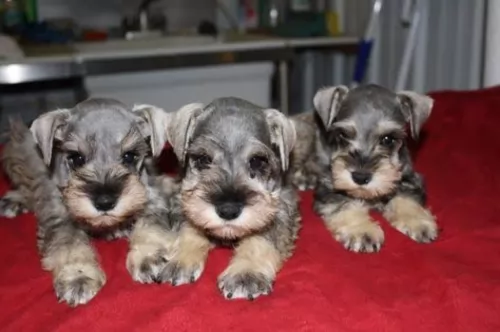 Your Miniature Schnauzer is pretty healthy and he isn’t likely to cost you much in terms of vet fees. There are however some common dog problems that you want to be aware of such as cataracts of the eye and hypothyroidism.
Your Miniature Schnauzer is pretty healthy and he isn’t likely to cost you much in terms of vet fees. There are however some common dog problems that you want to be aware of such as cataracts of the eye and hypothyroidism.
This a a problem in the lens of the eye. The lens should be clear, and when a dog has a cataract, it obscures the vision. The size of the cataract can lead to blindness.
Diabetes in a dog can bring on cataracts as can genetics or damage to the eye from exposure to ultraviolet light. Fortunately, dogs with cataracts can still see. Dogs with old cataracts can have surgery to remove them.
When a dog owner suspects a cataract in their pet’s eye it is best to treat it immediately with anti-inflammatory dog cataract eye drops. Cataracts never go away however without surgery.
The thyroid gland in the neck produces a hormone called thyroxine. It controls metabolism, but with hypothyroidism, enough of the hormone isn’t made. Its a common disease which affects all dog breeds.
Signs of hypothyroidism include hair loss, weight gain, intolerance to cold and a troublesome skin. To have the disease diagnosed, the vet will do a series of blood tests.
 This isn’t a particularly energetic dog and he can tend to become lazy. Don’t allow this as becoming unfit and overweight can be very bad for such large dog. Being so large already puts stress on the dog’s body, and the dog is already susceptible to cardiac and skeletal problems. Allowing him to become lazy and overweight will be a death sentence for this large dog. It is imperative to make sure you take him on walks and play games with him.
This isn’t a particularly energetic dog and he can tend to become lazy. Don’t allow this as becoming unfit and overweight can be very bad for such large dog. Being so large already puts stress on the dog’s body, and the dog is already susceptible to cardiac and skeletal problems. Allowing him to become lazy and overweight will be a death sentence for this large dog. It is imperative to make sure you take him on walks and play games with him.
The coat of your dog is thick and medium length and he will require being brushed at least twice a week. You may want to also trim the longer hair you find around his face and legs.
When it comes to his ears, you can moisten some cotton wool and wipe the inside of his ears to remove dirt and excess wax. Remember not to probe too deeply to avoid damaging the ear. If you’re uncertain how to do this, your vet can explain to you how its done.
Check his teeth regularly as dental disease can affect other areas of the body too. Don’t allow his nails to get too long as they can cause paw problems and the nails can hook onto things and cause injury.
Because this is a giant breed, the puppy will grow for a long time. Speak to your vet about how to ensure you feed your puppy in such a way that he doesn’t grow too quickly.
If you feed your dog a commercially manufactured food, make sure its one of the top quality brands. Include home-made cooked food such as chicken, rice and vegetables into his kibble from time to time, and also try to feed him some raw meat occasionally.
Fresh, cool water must be available to your Irish Wolfhound around the clock.
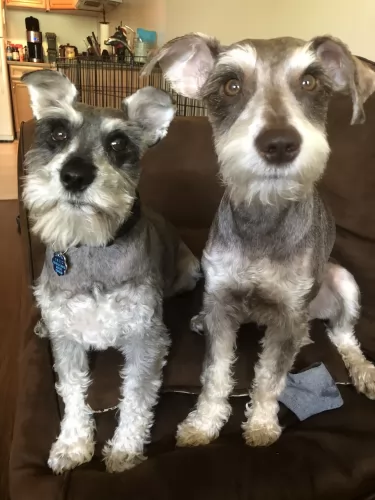 Let’s look at several ways you need to care for your Miniature Schnauzer -
Let’s look at several ways you need to care for your Miniature Schnauzer -
Make sure you have his puppy injections on time. This means knowing which veterinarian you’ll use. Later on if you don’t want to go in for breeding, you will need to have your pet spayed or neutered.
Make sure you have a nice warm, dry spot for your dog to sleep. It can be a cardboard box, or you can buy a dog basket or sleeping platform. Make sure your pet loves it and knows he can retreat to it anytime he wants.
If he goes outside for a few hours, make sure that he has a place to lie in the shade and away from the elements.
Good food promotes good health and longevity. You can feed your pet one of the top quality commercially manufactured foods and give your pet some variety by adding in some boiled chicken, vegetables and brown rice. Some raw meat occasionally can also be excellent for your pet.